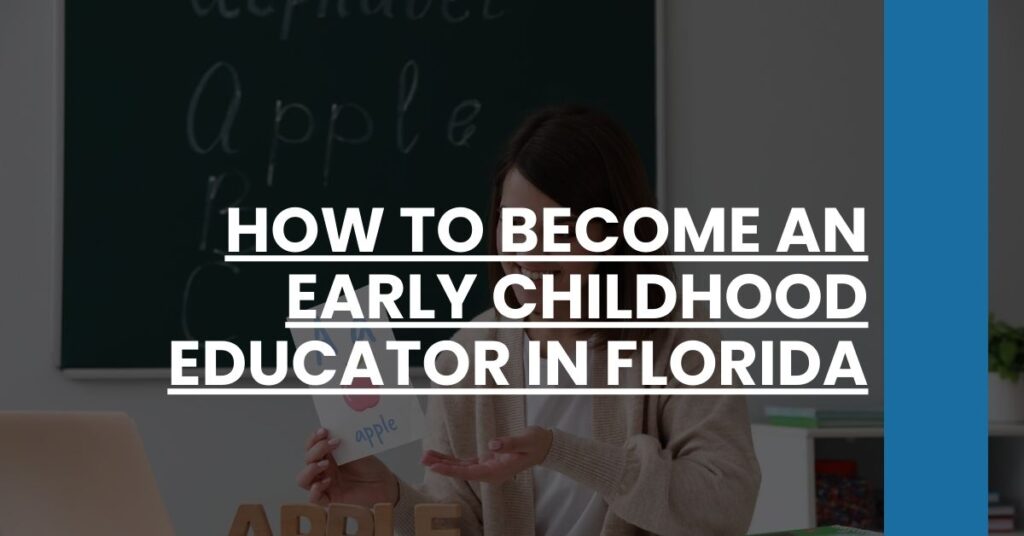Looking for programs in a specific city? Check out our lists of CDA in Jacksonville, Miami, Tampa, Orlando, St. Petersburg, Hialeah, Port St. Lucie, Cape Coral, Tallahassee, and Fort Lauderdale.
Becoming an early childhood educator in Florida is a rewarding journey filled with opportunities.
- Understand certification requirements: Learn the steps to obtain your Florida Temporary and Professional Certificates.
- Find the right programs: Discover local early childhood education programs that align with your career goals.
- Stay informed: Keep up with ongoing professional development and certification renewal.
Your path to becoming an early childhood educator in Florida starts here.
Looking for Early Childhood Educator Information On States Bordering Florida?
In addition to Florida, we suggest looking for schools in nearby states.
- How to Become An Early Childhood Educator in Georgia
- How to Become An Early Childhood Educator in Alabama
- How to Become An Early Childhood Educator in South Carolina
- How to Become An Early Childhood Educator in Mississippi
- How to Become An Early Childhood Educator in Louisiana
Certification Programs and Pathways
Certification is vital for aspiring early childhood educators, ensuring they meet Florida’s standards and requirements. Obtaining the right credentials paves the way for a successful teaching career.
Florida Temporary Certificate
The first step is acquiring a Florida Temporary Certificate. This certification allows you to begin teaching while completing further requirements. Here’s what you need:
- Bachelor’s Degree: You need a bachelor’s degree in education or a related field.
- Pass FTCE General Knowledge Test: This exam assesses basic skills in English language, reading, mathematics, and essay writing.
- Pass the Subject Area Examination: Depending on your focus, you will need to pass a subject-specific competency exam.
- Pass the Professional Education Test: This test measures professional preparedness and understanding of educational methodologies.
The Temporary Certificate is valid for three years, giving you ample time to gain practical experience and further your qualifications.
Florida Professional Certificate
Once you have your Temporary Certificate, the next goal is the Florida Professional Certificate. This is what you need to secure it:
- Complete Approved Preparation Program: Enroll in a state-approved teacher preparation program or Educator Preparation Institute (EPI).
- Demonstrate Competency: Pass all required FTCE exams and demonstrate competency in teaching principles and strategies.
This certificate is renewable every five years, maintaining your eligibility to teach and enhancing your professional growth.
Alternative Certification Programs
For those with a degree in a field other than education, alternative certification programs offer a viable pathway. These programs provide the necessary training and pedagogical skills to transition into early childhood education. They are tailored to accommodate the backgrounds and schedules of working professionals.
Reciprocity Agreements
If you are an educator certified in another state, Florida has reciprocity agreements that can ease the transfer process. This means you might be eligible to teach in Florida without starting the certification process from scratch.
Continuous Professional Development
Stay ahead in your career by engaging in continuous professional development. Here are some ways to do that:
- Attend Workshops and Seminars: Gain new insights and update your teaching methods.
- Join Professional Learning Communities: Collaborate and share best practices with other educators.
- Pursue Further Education: Consider advanced degrees or specialized certifications.
Remaining current with educational trends and innovations ensures you provide the highest quality education and keeps your certification valid.
Early Childhood Education Programs
Finding the right program is crucial. Consider programs that align with your career goals, offer robust training, and support your certification journey. Look for:
- Accredited Institutions: Ensure programs are accredited and recognized by the state.
- Flexible Schedules: For working professionals, flexible schedules can be a game-changer.
- Support Services: Look for programs offering mentorship, career services, and exam preparation support.
Embarking on a career as an early childhood educator in Florida is a journey filled with learning and growth. By following the certification pathways and engaging in professional development, you can achieve your goal and profoundly impact young learners’ lives.

